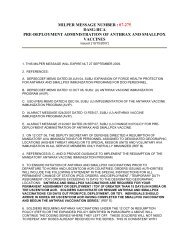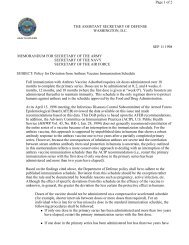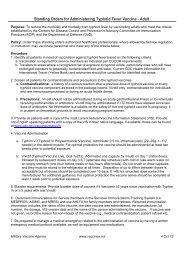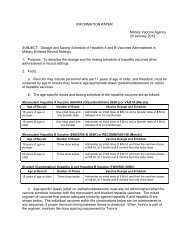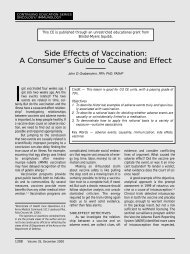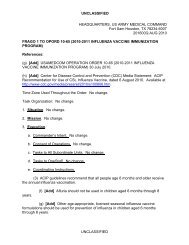Influenza - Seasonal Vaccination Program Questions and ... - MILVAX
Influenza - Seasonal Vaccination Program Questions and ... - MILVAX
Influenza - Seasonal Vaccination Program Questions and ... - MILVAX
Create successful ePaper yourself
Turn your PDF publications into a flip-book with our unique Google optimized e-Paper software.
<strong>Influenza</strong> - <strong>Seasonal</strong> <strong>Vaccination</strong> <strong>Program</strong><br />
<strong>Questions</strong> <strong>and</strong> Answers<br />
Prepared by<br />
Military Vaccine Agency - Vaccine Healthcare Centers Network (<strong>MILVAX</strong>-VHCN),<br />
Office of The Army Surgeon General, U.S. Army<br />
Last Updated: 02 Jan 14<br />
www.vaccines.mil<br />
877-GET-VACC<br />
DoDVaccines@mail.mil
<strong>Influenza</strong> - <strong>Seasonal</strong> <strong>Vaccination</strong> <strong>Program</strong><br />
<strong>Questions</strong> <strong>and</strong> Answers<br />
Policy <strong>and</strong> Management<br />
A. Department of Defense (DoD) <strong>Seasonal</strong> <strong>Influenza</strong> <strong>Vaccination</strong> <strong>Program</strong> (IVP)<br />
The Disease<br />
A. General Information<br />
B. Prevention<br />
The Vaccines<br />
A. General <strong>Questions</strong><br />
B. Trivalent Inactivated <strong>Influenza</strong> Vaccine (IIV3), Injectable: Fluzone®, Afluria®, Flurivin® <strong>and</strong><br />
Flucelvax®<br />
C. Live Attenuated Intranasal Vaccine (LAIV), Intranasal FluMist®<br />
Myths <strong>and</strong> Facts<br />
A. Myths<br />
B. Facts<br />
Adapted from the Immunization Action Coalition (with permission) <strong>and</strong> the Centers for Disease Control <strong>and</strong> Prevention (CDC).<br />
www.vaccines.mil - Page 2 of 13 - 02 Jan 14
Policy <strong>and</strong> Management<br />
A.<br />
Department of Defense (DoD) <strong>Seasonal</strong> <strong>Influenza</strong> <strong>Vaccination</strong> <strong>Program</strong> (IVP)<br />
1.<br />
What is the current DoD <strong>Seasonal</strong> <strong>Influenza</strong> policy <strong>and</strong> who should be vaccinated?<br />
DoD policy states influenza immunizations are m<strong>and</strong>atory for all Active Duty, National<br />
Guard, <strong>and</strong> Reserve personnel. <strong>Influenza</strong> immunizations are m<strong>and</strong>atory for DoD civilian <strong>and</strong><br />
contract health care personnel who provide direct patient care at military treatment facilities<br />
(MTFs).<br />
Note: more information on DoD influenza policies can be found at<br />
www.vaccines.mil/Policies/<strong>Influenza</strong>_-_<strong>Seasonal</strong>.<br />
The Office of the Assistant Secretary of Defense for Health Affairs (HA) Policy 08-005,<br />
dated 4 April 2008, m<strong>and</strong>ates all civilian health care personnel who provide direct care to<br />
patients in medical treatment facilities must be immunized against seasonal influenza each<br />
year as a condition of employment. www.vaccines.mil/documents<br />
/1169HCPFluHAPolicy_08_005.pdf.<br />
2.<br />
What is the primary goal of DoD's <strong>Seasonal</strong> <strong>Influenza</strong> Vaccine <strong>Program</strong> (IVP)?<br />
3.<br />
The primary goal is to vaccinate 100 percent of all Active Duty, National Guard, Reserve,<br />
<strong>and</strong> Health Care Providers whom provide direct patient care with a milestone goal of ≥ 90<br />
percent by 16 December this year.<br />
Who does the Advisory Committee on Immunization Practices (ACIP), recommend<br />
receive an annual influenza vaccination?<br />
ACIP recommends the use of the seasonal influenza vaccinations for all people 6 months<br />
<strong>and</strong> older. Additionally, emphasis on providing routine annual vaccinations to certain groups<br />
at higher risk for influenza infection or complications should be a priority:<br />
Anyone who is at risk of complications from influenza, or more likely to require<br />
medical care.<br />
Women who will be pregnant during influenza season.<br />
Anyone with long-term health problems including heart disease, kidney disease, liver<br />
disease, lung disease, metabolic disease (diabetes), asthma, anemia <strong>and</strong> other blood<br />
disorders.<br />
Anyone with a weakened immune system, long-term treatment with drugs such as<br />
steroids, <strong>and</strong> cancer treatment with x-rays or drugs.<br />
Anyone with certain muscle or nerve disorders (such as spinal cord injuries, seizure<br />
disorders or cerebral palsy) that can lead to breathing or swallowing problems.<br />
Anyone 6 months through 18 years of age on long-term aspirin treatment.<br />
Residents of nursing homes <strong>and</strong> other chronic-care facilities.<br />
Anyone who lives with or cares for people at high risk for influenza-related<br />
complications.<br />
www.vaccines.mil - Page 3 of 13 - 02 Jan 14
Health care providers.<br />
Household contacts <strong>and</strong> caregivers of children from 0-5 years of age <strong>and</strong> people 50<br />
years <strong>and</strong> older.<br />
4.<br />
When will the IVP begin?<br />
Vaccine shipments occur in early August. Your installation seasonal influenza vaccine<br />
program should begin immediately upon receipt of influenza vaccine to protect individuals at<br />
risk from developing influenza or its complications. All Services will follow Service-specific<br />
implementation guidelines. <strong>Influenza</strong> vaccinations should continue until supply is exhausted<br />
or the vaccine expiration is reached.<br />
5.<br />
What documentation is required with influenza immunization?<br />
It is important to document immunizations properly into electronic immunization <strong>and</strong><br />
paper-based systems. Vaccine, date of administration, lot number, manufacturer, Vaccine<br />
Information Statement version date, name of vaccine administrator <strong>and</strong> medical exemptions<br />
for military personnel must be documented in Service-specific immunization tracking<br />
systems.<br />
All Services will monitor implementation using Service-specific electronic immunization<br />
tracking systems (Medical Protection System (MEDPROS), Aeromedical Services<br />
Information Management System (ASIMS), Medical Readiness Reporting System (MRRS),<br />
Shipboard Automated Medical System (SAMS), <strong>and</strong> the Defense Eligibility Enrollment<br />
Reporting System (DEERS). All Military Health System (MHS) beneficiary immunizations<br />
should be documented in the electronic health record.<br />
6.<br />
Where did the DoD get this year's influenza vaccine?<br />
7.<br />
8.<br />
DoD has arranged with the Defense Logistics Agency – Troop Support (DLA-TS) to contract<br />
for influenza vaccine from four different manufacturers. Three manufacturers will provide<br />
injectable trivalent inactivated influenza vaccine (IIV3), Sanofi-Pasteur (Fluzone®), CSL<br />
Biotherapies/Merck (Afluria®), <strong>and</strong> Novartis (Fluvirin® <strong>and</strong> Flucelvax®). MedImmune<br />
(FluMist®) produces the intranasal quadravalent live, attenuated influenza vaccine (LAIV4).<br />
Note: More information regarding this year's influenza vaccines <strong>and</strong> the presentations<br />
available can be found at www.vaccines.mil/documents<br />
/1642_<strong>Influenza</strong>_Vaccines_for_Different_Age_Groups_-_2013-14.pdf<br />
Which personnel are required to receive the influenza vaccine?<br />
DoD policy requires annual influenza immunizations for all Active Duty, National Guard <strong>and</strong><br />
Reserve personnel, <strong>and</strong> health care personnel who provide direct patient care according to<br />
Service-specific guidelines.<br />
Will my immunization be monitored by my Service?<br />
Yes. All Services will monitor implementation using Service-specific immunization tracking<br />
systems (MEDPROS, ASIMS, MRRS, <strong>and</strong> SAMS).<br />
www.vaccines.mil - Page 4 of 13 - 02 Jan 14
9.<br />
Who should receive the influenza vaccine <strong>and</strong> in what order if there is a shortage?<br />
Should an unanticipated shortage of vaccine occur, HA will provide further direction<br />
regarding priority tiers, consistent with recommendations published in the Centers for<br />
Disease Control <strong>and</strong> Prevention (CDC's) Morbidity <strong>and</strong> Mortality Weekly Report.<br />
10.<br />
Who can I contact if I have a problem after receiving my vaccine?<br />
The Disease<br />
If you are having a medical emergency call 911. Contact your healthcare provider or the<br />
clinic at which you received your vaccination for appropriate follow-up.<br />
You may also contact the the DoD 24/7 Vaccine Healthcare Centers Network at (866)<br />
210-6469 or email via at https://ask<strong>MILVAX</strong>-VHCN.wramc.amedd.army.mil. Any clinically<br />
significant medical event that occurs after vaccination should be submitted to the Vaccine<br />
Adverse Event Reporting System (VAERS) at www.vaers.hhs.gov.<br />
A.<br />
General Information<br />
1.<br />
What is seasonal influenza disease?<br />
<strong>Influenza</strong> is a contagious respiratory illness caused by influenza types A or B viruses.<br />
<strong>Influenza</strong> viruses are easily spread by airborne respiratory droplets from person to person<br />
(often by sneezing or coughing).<br />
Symptoms of infection include fever, muscle aches, headache, malaise (a general feeling of<br />
sickness), nonproductive cough, sore throat, <strong>and</strong> runny nose. The flu causes mild illness in<br />
most people, the majority of whom will not need medical care or antiviral drugs, <strong>and</strong> usually<br />
recover in less than two weeks. Some people, however, can suffer flu complications that<br />
result in being hospitalized. Sometimes influenza infection results in death.<br />
Pneumonia, bronchitis, sinus infections <strong>and</strong> ear infections are examples of more severe<br />
flu-related complications. The flu also can make chronic health problems worse. For<br />
example, people with asthma may experience more frequent asthma attacks while they<br />
have the flu. The flu may also worsen congestive heart failure in people with this condition.<br />
2.<br />
Who is at high risk for developing flu related complications?<br />
3.<br />
Children younger than 5 but especially children younger than 2 years of age, adult 65 years<br />
<strong>and</strong> older, pregnant women <strong>and</strong> individuals with various chronic medical conditions are at<br />
greatest risk for hospitalization <strong>and</strong> possibly death related to infection.<br />
A full list of high-risk conditions can be found at: www.cdc.gov/flu/about/disease<br />
/high_risk.htm<br />
How does influenza spread?<br />
<strong>Influenza</strong> spreads from person-to-person through aerosolized respiratory droplets released<br />
when a person coughs, sneezes, or breathes. People may also become infected with<br />
www.vaccines.mil - Page 5 of 13 - 02 Jan 14
4.<br />
5.<br />
influenza by touching something contaminated with the virus <strong>and</strong> then touching their mouth,<br />
nose, or eyes.<br />
How soon will I get sick after exposure to the influenza virus?<br />
Most healthy adults may be able to infect others beginning 1 day before symptoms develop<br />
<strong>and</strong> up to 5 to 7 days after becoming sick. Children may pass the virus for longer than 7<br />
days. Symptoms start 1 to 4 days after the virus enters the body. That means that you<br />
may be able to pass on the flu to someone else before you know you are sick, as well as<br />
while you are sick. Some persons can be infected with the flu virus but have no symptoms.<br />
During this time, those persons may still spread the virus to others.<br />
What should I do if I am infected with the influenza virus?<br />
Getting plenty of rest, drinking fluids, <strong>and</strong> avoiding alcohol <strong>and</strong> tobacco will allow your body<br />
to fight off the illness more quickly. If you use over-the-counter medications to relieve<br />
symptoms, it is important to follow the manufacturer's instructions. Protect others by<br />
covering your mouth when coughing <strong>and</strong> sneezing, wash your h<strong>and</strong>s frequently, <strong>and</strong> stay at<br />
home if you are feeling ill.<br />
6.<br />
Will new strains of influenza virus circulate this season?<br />
<strong>Influenza</strong> viruses are constantly changing, so it is not unusual for new strains of influenza<br />
virus to emerge at any time of the year. This year's influenza vaccines were made using the<br />
following strains:<br />
A/California/07/2009 (H1N1)-like virus<br />
A/Victoria/361/2011 (H3N2)-like virus<br />
B/Massachusetts/2/2012-like virus<br />
B/Brisbane/60/2008 like virus (for the quadravalent influenza vaccine)<br />
The B/Massachusetts <strong>and</strong> B/Brisbane strains are a change from last year's formulation.<br />
B.<br />
Prevention<br />
1.<br />
2.<br />
3.<br />
Why do I need to be immunized against influenza every year?<br />
Circulating influenza viruse strains change from year to year. Protection that develops after<br />
a person is infected or immunized against the circulating viruses of one season does not<br />
provide adequate cross-protection when a new influenza strain develops.<br />
What is the best way to protect myself <strong>and</strong> my family from getting influenza if we<br />
are not vaccinated?<br />
<strong>Vaccination</strong> is your best protection against influenza infection. If you are unable to receive<br />
the vaccine, avoid close contact with people sick with the flu. Wash your h<strong>and</strong>s often with<br />
soap <strong>and</strong> water or if that is unavailable use alcohol-based h<strong>and</strong> sanitizer. To prevent the<br />
spread of germs, avoid touching your eyes, nose, or mouth <strong>and</strong> cover your mouth <strong>and</strong> nose<br />
with a tissue when coughing or sneezing.<br />
When should I get vaccinated?<br />
It is recommended that people get vaccinated against influenza as soon as vaccine<br />
www.vaccines.mil - Page 6 of 13 - 02 Jan 14
4.<br />
The Vaccines<br />
becomes available in your community. <strong>Vaccination</strong>s should occur through the entire<br />
influenza season which ends when product expires in early summer or supply is<br />
exhausted.<br />
Where can I receive my vaccine?<br />
The influenza vaccine can be received from many MTF's <strong>and</strong> clinics within DoD. To find a<br />
clinic near use the <strong>MILVAX</strong>-VHCN clinic finder found at http://www.vaccines.mil/ClinicFinder.<br />
Additionally, the TRICARE Management Activity issued the final rule authorizing TRICARE<br />
retail network pharmacies to administer seasonal influenza at no cost to beneficiaries the<br />
for the 2013-2014 influenza season. Soldiers who receive the influenza vaccination from<br />
non-military facilities must provide appropriate immunization data to their unit's MEDPROS<br />
point of contact NLT COB of the next duty day following vaccination in order to properly<br />
document the annual requirement.<br />
A.<br />
General <strong>Questions</strong><br />
1.<br />
2.<br />
How effective is influenza immunization in protecting me from illness caused by<br />
the different strains of influenza?<br />
Vaccines are developed each year in an attempt to match the predicted virus strains. When<br />
they are well-matched, immunization of healthy adults is 70-90% effective in preventing<br />
influenza illness. When the majority of circulating influenza strains is not well matched by<br />
the vaccine, effectiveness has been as low as 47-77%. Vaccines may be somewhat less<br />
effective in elderly persons <strong>and</strong> very young children, but immunization can still help prevent<br />
serious complications from influenza illness.<br />
What if I'm pregnant or breastfeeding? Can I still receive the seasonal influenza<br />
vaccine?<br />
Yes. The ACIP, the American College of Obstetricians <strong>and</strong> Gynecologists, <strong>and</strong> the<br />
American Academy of Family Physicians have all recommended the routine vaccination of<br />
women who are pregnant, or who become pregnant during the influenza season. Pregnant<br />
women, as well as lactating/postpartum women <strong>and</strong> their newborn babies, are at high risk<br />
for influenza complications. Pregnant women may receive the inactivated injectable<br />
influenza vaccine, during any point of gestation <strong>and</strong> postpartum; breastfeeding women may<br />
receive the inactivated or live vaccine.<br />
3.<br />
Are influenza vaccines harmful during my pregnancy?<br />
Pregnant women are at high risk for influenza related complications <strong>and</strong> are a priority group<br />
for vaccination. The FDA has classified Fluzone <strong>and</strong> Afluria as "Pregnancy Category B",<br />
indicating that animal reproduction studies have not demonstrated a fetal risk, but there are<br />
no controlled studies in pregnant women.<br />
The ACIP, the American College of Obstetricians <strong>and</strong> Gynecologists (ACOG), <strong>and</strong> the<br />
American Academy of Family Physicians recommends the use of injectable influenza<br />
www.vaccines.mil - Page 7 of 13 - 02 Jan 14
9.<br />
vaccine for immunization of pregnant women because the benefit of protection outweighs<br />
the potential risk of any adverse event.<br />
If a child is receiving an influenza vaccination for the first time, what is the<br />
appropriate administration schedule?<br />
According to the ACIP <strong>and</strong> the American Academy of Pediatrics (AAP):<br />
Children aged 6 months to 8 years who are receiving the influenza vaccine for the first time<br />
or whose previous vaccination status is unknown should receive two (2) doses of vaccine<br />
separated by at least four weeks.<br />
Children aged 6 months through 8 years who have NOT received two (2) or more total doses<br />
of seasonal influenza vaccine since July 2010 should receive two (2) doses of vaccine<br />
separated by at least four weeks.<br />
Children aged 6 months through 8 years who received two (2) or more total doses of<br />
seasonal influenza vaccine since July 2010 <strong>and</strong> all children 9 <strong>and</strong> older should receive one<br />
dose of seasonal influenza vaccine.<br />
10. If a child 6 months - 8 years of age is receiving an influenza vaccination for the first<br />
time, must the same type of vaccine be administered for both doses?<br />
No. The first <strong>and</strong> second doses can be from different manufactures or age-appropriate<br />
formulations. IIV can be used when vaccinating children aged 6 months to 8 years <strong>and</strong> LAIV<br />
(FluMist®) for children aged 2 years <strong>and</strong> older, who have not been previously vaccinated.<br />
11. How are injectable <strong>and</strong> intranasal influenza vaccines shipped <strong>and</strong> stored?<br />
All injectable <strong>and</strong> intranasal vaccines are shipped <strong>and</strong> should be stored at 2 to 8 degrees<br />
Celsius. When the vaccine arrives at your facility, it must immediately be placed in a<br />
refrigerator. In addition, protect Afluria, Flucelvax <strong>and</strong> Fluvirin from light until use. Do not use<br />
vaccines past the expiration date printed on the vaccine vial or syringe. Once the Afluria<br />
multi-dose vial has been punctured the vaccine must be used within 28 days. Fluzone<br />
multi-dose vials may be used after puncture until the expiration date on the vial. Any<br />
prefilled syringes, sprayers or single dose vials must be discarded at the end of the day if<br />
the tip cap is removed, a needle is placed on the syringe or the cap of the vial has been<br />
removed.<br />
12. If I need to administer a tuberculin skin test (TST), should I be concerned about<br />
administering the influenza vaccine at the same time?<br />
Yes. The live vaccine (FluMist®) may suppress a positive response to a tuberculin skin<br />
testing (TST or PPD) in a person who is infected with tuberculosis (TB), resulting in a false<br />
negative skin test. If a person needs TB skin testing <strong>and</strong> LAIV, you can correctly administer<br />
both in one of three ways<br />
Give the TST (PPD) <strong>and</strong> the vaccine simultaneously.<br />
Give the TST (PPD) first <strong>and</strong> when the person returns to have the skin test results<br />
interpreted, administer the live vaccine.<br />
www.vaccines.mil - Page 8 of 13 - 02 Jan 14
B.<br />
13.<br />
14.<br />
15.<br />
Give the live vaccine <strong>and</strong> then delay administration of the TST (PPD) for 28 days.<br />
Injectable influenza vaccines <strong>and</strong> tuberculin skin test can be administered<br />
concurrently or at any interval.<br />
Can live vaccines <strong>and</strong> the influenza vaccine be administered on the same day?<br />
The inactivated injectable influenza vaccine may be administered on the same day as live<br />
vaccines or at any interval thereafter, but the live intranasal influenza vaccine must be<br />
administered on the same day as the other live vaccines or separated by an interval of at<br />
least 28 days.<br />
Can I get seasonal flu illness from the flu vaccine?<br />
<strong>Influenza</strong> vaccine does not cause the flu virus. Some vaccinated people may have mild<br />
flu-like symptoms, which are caused by the immune system's response to the vaccine.<br />
Other people may feel soreness or have mild, uncomfortable side effects. The most<br />
common side effects associated with the injected flu vaccine are redness, swelling, <strong>and</strong><br />
soreness at the injection site. The nasal spray type of flu vaccine may cause runny nose,<br />
nasal congestion, sore throat, <strong>and</strong> chills in some patients. For more information please visit<br />
the CDC flu website or contact the <strong>MILVAX</strong>-VHCN.<br />
Why does my child need to get the flu vaccine?<br />
Infants <strong>and</strong> children, as well as the elderly, are more likely to have serious complications<br />
from the flu virus. In addition, children may be exposed to flu virus at school <strong>and</strong> daycare.<br />
Please contact the <strong>MILVAX</strong>-VHCN if you want to discuss the influenza vaccine with a<br />
<strong>MILVAX</strong>-VHCN healthcare provider.<br />
Trivalent Inactivated <strong>Influenza</strong> Vaccine (IIV3), Injectable: Fluzone®, Afluria®, Flurivin®<br />
<strong>and</strong> Flucelvax®<br />
1.<br />
What is Fluzone®?<br />
2.<br />
Fluzone®, Fluzone® Pediatric, Fluzone® High-Dose (HD), <strong>and</strong> Fluzone® Intradermal are<br />
inactivated injectable influenza virus vaccines manufactured by Sanofi-Pasteur.<br />
Presentations available this year include a multi-dose vial <strong>and</strong> a thimerosal-free single-dose<br />
syringe.<br />
Fluzone <strong>and</strong> Fluzone Pediatric are licensed for persons aged 6 months <strong>and</strong> older, Fluzone<br />
HD is licensed for persons aged 65 years <strong>and</strong> older <strong>and</strong> Fluzone Intradermal is licensed for<br />
persons aged 18 through 64 years. DoD only contracted for Fluzone <strong>and</strong> Fluzone Pediatric<br />
this season.<br />
What is Afluria®?<br />
Afluria® is an inactivated injectable influenza virus vaccine manufactured by CSL<br />
Biotherapies. The presentation available this year include a multi-dose vial. Afluria is<br />
licensed for persons aged 5 years <strong>and</strong> older; however, ACIP recommends Afluria be<br />
administered to children aged 9 years <strong>and</strong> older due to increased reports of febrile reactions<br />
in children 5 to 8 years of age. Afluria may be given, if no other age-appropriate, licensed<br />
seasonal influenza vaccine is available for children aged 5 through 8 years who are at high<br />
www.vaccines.mil - Page 9 of 13 - 02 Jan 14
3.<br />
4.<br />
risk for influenza complications.<br />
What is Fluvirin®?<br />
Fluvirin® is an inactivated injectable influenza virus vaccine manufactured by Novartis. The<br />
presentation available this year include a thimerosal-free single-dose syringe. It is licensed<br />
for persons 4 years of age <strong>and</strong> older.<br />
What is Flucelvax®?<br />
Flucelvax® is a new cell-culture-derived, inactivated injectable influenza virus vaccine<br />
manufactured by Novartis. It is presented in a thimerosal-free single-dose syringe. It is<br />
licensed for persons 18 years of age <strong>and</strong> older.<br />
5.<br />
Who should receive the injectable vaccines?<br />
ACIP recommends the use of injectable vaccines for immunization of persons described as<br />
eligible in manufacturer package inserts <strong>and</strong> for whom the live virus vaccine (FluMist®) is<br />
contraindicated.<br />
Anyone who is at risk of complications from influenza, or more likely to require<br />
medical care.<br />
Women who are or will be pregnant during influenza season.<br />
Anyone with long-term health problems.<br />
Anyone with a weakened immune system.<br />
Anyone 6 months through 18 years of age on long-term aspirin treatment.<br />
Residents of nursing homes <strong>and</strong> other chronic-care facilities.<br />
Anyone who lives with or cares for people at high risk for influenza-related<br />
complications.<br />
Household contacts <strong>and</strong> caregivers of children from birth up to 5 years of age <strong>and</strong><br />
people 50 years <strong>and</strong> older.<br />
6.<br />
Who should not receive the injectable influenza vaccines?<br />
People who have a severe allergy to chicken proteins, eggs, egg products, or any<br />
components of the influenza vaccine.<br />
People who have had a severe reaction to an influenza vaccination in the past.<br />
People who have a history of Guillain-Barré Syndrome.<br />
People who are sick with a fever. These individuals may be immunized once their<br />
symptoms resolve.<br />
Children younger than 6 months of age.<br />
7.<br />
What side effects can I expect when I receive the injectable influenza vaccine?<br />
The viruses in inactivated influenza vaccine have been killed so you cannot become infected<br />
with influenza. Side effects which may occur are: soreness, redness, or swelling at the<br />
vaccination site., l fever, weakness, headache, <strong>and</strong> muscle aches. If these problems occur,<br />
they usually begin soon after immunization <strong>and</strong> typically last for one or two days. Most<br />
people who receive influenza vaccine experience no serious problems. In rare instances,<br />
serious problems such as a severe allergic reaction can occur.<br />
www.vaccines.mil - Page 10 of 13 - 02 Jan 14
C. Live Attenuated Intranasal Vaccine (LAIV), Intranasal FluMist®<br />
1.<br />
2.<br />
What is FluMist®?<br />
FluMist® is a quadrivalent, live, attenuated influenza virus vaccine manufactured by<br />
MedImmune. The only presentation is a thimerosal free single dose sprayer.<br />
Who should receive the live, attenuated intranasal vaccine?<br />
FluMist® is approved for all healthy people aged 2-49 years who are not pregnant. For more<br />
information, see http://www.vaccines.mil/flu.<br />
3.<br />
Who should not receive the live, attenuated intranasal vaccine?<br />
4.<br />
Myths <strong>and</strong> Facts<br />
The following populations should not be immunized with the Live Attenuated Intranasal<br />
Vaccine:<br />
People less than 2 years old or those 50 years old or older<br />
People with asthma, reactive airways disease, or other chronic disorders of the<br />
pulmonary or cardiovascular systems<br />
People with other underlying medical conditions, including such metabolic diseases<br />
as diabetes, cardiac/kidney/liver diseases, <strong>and</strong> blood disorders<br />
People with known or suspected immunodeficiency diseases or who are receiving<br />
immunosuppressive therapies<br />
Children or adolescents receiving aspirin therapy or other<br />
People with a history of Guillain-Barré Syndrome<br />
Pregnant women<br />
People with a history of hypersensitivity, including anaphylaxis, to any of the<br />
components of LAIV or to eggs<br />
What side effects can I expect when I receive FluMist®?<br />
The viruses in the intranasal vaccine are weakened <strong>and</strong> do not cause severe symptoms<br />
associated with influenza. Common side effects may include runny nose, headache, fever,<br />
cough, <strong>and</strong> sore throat. Other possible side effects are chills, cough, decreased activity,<br />
decreased appetite, headache, irritability, muscle aches, <strong>and</strong> tiredness/weakness. For<br />
more information, see http://www.flumist.com.<br />
A.<br />
Myths<br />
1.<br />
Myth #1: Having influenza is similar to getting a cold; therefore, an immunization is<br />
not really necessary.<br />
Fact: On average, more than 226,000 people are hospitalized from flu complications,<br />
including 20,000 children; about 36,000 people die from influenza each year. <strong>Vaccination</strong><br />
provides the best protection available from the influenza virus - even when the vaccine does<br />
not closely matchthe circulating flu strains. A vaccination may lessen influenza illness<br />
severity <strong>and</strong> is important for persons at high-risk for serious flu-related complications <strong>and</strong> for<br />
close contacts of high-risk individuals. Ref: http://www.cdc.gov/flu/about/qa/flushot.htm <strong>and</strong><br />
www.vaccines.mil - Page 11 of 13 - 02 Jan 14
2.<br />
3.<br />
4.<br />
5.<br />
http://www.cdc.gov/flu/about/qa/disease.htm.<br />
Myth #2: Side effects from the influenza vaccine are worse than influenza itself.<br />
Fact: The most common side effect you are likely to experience with the injectable<br />
influenza vaccine is a sore arm. The risk of a rare allergic reaction is far less than the risk of<br />
severe complications from influenza. Live, intranasal influenza vaccine can cause mild<br />
symptoms in the recipient. Common side effects can include runny nose, headache, fever,<br />
cough, <strong>and</strong> sore throat. Ref: http://www.cdc.gov/flu/about/qa/flushot.htm<br />
Myth #3: Only elderly people really need the influenza vaccine.<br />
Fact: Among elderly persons not living in chronic-care facilities (such as nursing homes)<br />
<strong>and</strong> those persons with long-term (chronic) medical conditions (such as asthma, diabetes,<br />
or heart disease), influenza vaccinations are 30-70% effective in preventing hospitalization<br />
for pneumonia (a lung infection) <strong>and</strong> influenza. Among elderly nursing home residents,<br />
influenza vaccinations are the most effective in preventing severe illness, complications that<br />
may follow influenza (like pneumonia), <strong>and</strong> deaths related to influenza. Because persons<br />
aged 65 years <strong>and</strong> older are at highest risk for serious complications from influenza, it is<br />
also important that people who live with or care for those at high risk for serious<br />
complications get an influenza vaccination. Children younger than 6 months of age are at<br />
the most risk for having complications from influenza. However, they are too young to get<br />
the influenza vaccination. To protect these infants, it is very important that their household<br />
members <strong>and</strong> out-of-home caregivers be vaccinated against influenza. <strong>Influenza</strong> vaccine can<br />
prevent 66% or more influenza infections in young children, with even higher estimates for<br />
older children, when the vaccine strains are well matched to the flu viruses causing illness.<br />
Vaccinating close contacts of children can also help decrease children's risk of getting<br />
influenza. Everyone who is healthy <strong>and</strong> eligible to receive the vaccine should take<br />
advantage of the opportunity to boost their immunity to seasonal influenza. Ref:<br />
http://www.cdc.gov/flu/about/qa/vaccineeffect.htm<br />
Myth #4: You must get the influenza vaccine before the influenza season, or it is<br />
not worth getting.<br />
Fact: <strong>Influenza</strong> vaccine can be given before or during the influenza season. <strong>Influenza</strong><br />
vaccinations provide protection against the influenza strains contained in the vaccine during<br />
that influenza season. <strong>Vaccination</strong>s should begin as soon as vaccine is available <strong>and</strong><br />
continue throughout the influenza season. Ref: http://www.cdc.gov/flu/about<br />
/qa/misconceptions.htm.<br />
Myth #5: I can take medications prescribed by my doctor instead of getting the<br />
influenza vaccine.<br />
Fact: Antiviral medications given within the first few days of symptom onset can reduce the<br />
duration <strong>and</strong> severity of the disease, but cannot cure it. These drugs are not a substitute for<br />
the influenza vaccine. Remember, influenza vaccine is the first <strong>and</strong> best defense against<br />
seasonal influenza, but antiviral drugs can be an important second line of defense to treat<br />
influenza or prevent influenza infection. Ref: http://www.cdc.gov/flu/protect/antiviral<br />
/keyfacts.htm.<br />
B.<br />
Facts<br />
www.vaccines.mil - Page 12 of 13 - 02 Jan 14
1.<br />
Fact #1: Even if I get the influenza vaccine, can I still be infected with influenza?<br />
Yes. <strong>Influenza</strong> viruses are always changing. They can change from the time the vaccine is<br />
recommended <strong>and</strong> the beginning of influenza season, or they can even change during a<br />
season. Each year, experts study thous<strong>and</strong>s of influenza virus samples from around the<br />
world to figure out which viruses are making people sick <strong>and</strong> how these viruses are<br />
changing. With this information, they forecast which three virus strains are most likely to<br />
make the most people sick during the next influenza season. Each year, the seasonal<br />
influenza vaccine contains three influenza virus strains – one influenza A (H3N2) virus, one<br />
influenza A (H1N1) virus, <strong>and</strong> one influenza B virus. The selection of which viruses to<br />
include in the vaccine must be made in February of the prior year in order for vaccine to be<br />
produced in time for distribution the following season. When influenza viruses change, they<br />
may no longer closely match viruses used to make that season's influenza vaccine. This<br />
can make the vaccine less effective. But, even when this happens, the vaccine can still offer<br />
some cross-protection: The vaccine contains three viruses, so it can protect you against<br />
the other two viruses that may be making people sick. The immune protection you get from<br />
the vaccine can provide partial protection against influenza viruses that are related to those<br />
used to make the vaccine (this is called cross-protection). So while a less-than-ideal match<br />
can reduce vaccine benefit, the vaccine can still provide enough protection to make illness<br />
less severe <strong>and</strong> prevent influenza-related complications. A less-than-perfect vaccine is still<br />
the best protection we have against influenza. That is why CDC continues to recommend<br />
getting the vaccine even when there is a less-than-perfect match. Ref: http://www.cdc.gov<br />
/flu/about/qa/season.htm <strong>and</strong> http://www.cdc.gov/flu/about/qa/vaccineeffect.htm<br />
www.vaccines.mil - Page 13 of 13 - 02 Jan 14



